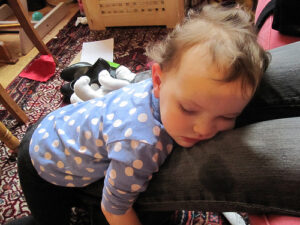You may have noticed that your child shows signs of being tired well before his designated “bedtime”. Nowadays, with so many parents working, and such packed schedules, bedtimes are getting to be later and later, or worse, all over the place. If you find yourself dealing with a cranky, difficult child at the end of a packed week, his bedtimes may be to blame.
In a recent article, Random Bedtimes Breed Bad Behavior for Kids, which found that in a study of over 10,000 children aged 3, 5, and 7, those with bedtimes after 9:00 p.m. were found to have more behavioral problems than their peers who had earlier bedtimes (for school-aged children, this may mean a bedtime closer to 7:30 or 8:00 p.m.). While this may not be shocking news, the study also found that those children who had random bedtimes had even worse behavior.
Inconsistent Bedtimes Cause Behavior Problems
In this study, the mothers of the younger subjects were asked to take a test that measured not only the child’s bedtimes, but also evaluated behavioral problems, emotional outbursts, signs of hyperactivity, and more. Additionally, the teachers of the 7 year olds were asked to fill out similar evaluations, but score the children on their school performance as well.
While I am not surprised by the results, this study did show that when children who had random bedtimes were moved to a flexible schedule, their behavior problems seemed to get better. Now, the study does have flaws, and I’m not sure how much each child slept, since the results are based on a parent or teacher-completed survey, but it does make a great point:
Our children need quality, quantity, AND consistency when it comes to sleep.

In order to avoid an over-tired and melt-down prone child, make sure that her bedtime is consistent. Our babies are only babies for so long, and while earlier bedtimes mean that late nights are out, they ensure that you give your children the best possible chance of having a good day, especially if they’re in school. To ensure a well-rested child, follow these quick tips:
• Good naps are essential to quality nighttime sleep. Make sure that your child is napping well.
• Mealtimes and bedtimes should be consistent.
• Your child may be exhibiting signs of sleepiness earlier than you think! Watch for eye-rubbing, zoning out, and crankiness! These can be signs of entering the overtired zone.
• Make sure that you are paying attention to your child’s wakefulness windows so that your child can get to bed when she is tired.
• Where your child sleeps is important. Make sure that the room is sufficiently dark, devoid of outside noise, and is a place for sleep.
• Establish a consistent bedtime routine so that your child begins to relax and mentally prepare for sleep before her head hits the pillow.
• Encourage healthy melatonin production by exposing your child to natural light during waking hours, and making sure you’re inside in a dimly lit room about an hour before bedtime.
• Limit screen exposure (and electronics in general) at least one hour before bed.
How do you make sure that your child gets to bed at the same time every night? Post your solution on my Facebook page and join the conversation!
Was this article helpful to you? Please tell us by commenting below! For more baby, toddler, and family sleep tips and tricks, please subscribe to The Sleep Lady’s Facebook, Twitter, Pinterest, Google+, and YouTube channel! If you are looking for more sleep content, please check out Get Sleep Now-an exclusive members-only area designed to provide in-depth help and support during your sleep coaching experience.
photo credit: lupinoduck via photopin cc




